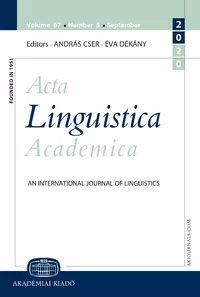The effects of time duration and bilingualism/trilingualism on second-language production
The effects of time duration and bilingualism/trilingualism on second-language production
Author(s): Hsiu-ling HsuSubject(s): Phonetics / Phonology, Translation Studies
Published by: Akadémiai Kiadó
Keywords: bilingualism; trilingualism; time-driven effect; delay effect; self-repair
Summary/Abstract: This investigation explored the effects of time duration and bilingualism/trilingualism on speakers' language production. A word-naming task was conducted under three conditions—700 ms, 1,000 ms, and unlimited time. The results showed that the participants incurred fewer errors and successfully corrected errors at 1,000 ms and unlimited time; the bilingual/trilingual advantage was identified in error self-repairs at 1,000 ms; and trilinguals were more strategic in correcting errors than monolinguals and bilinguals. This suggests that unlimited time did not ensure higher accuracy in lexical production and efficient error correction, and that 1,000 ms was the optimal timeframe for processing single monosyllabic Chinese characters.
- Issue Year: 70/2023
- Issue No: 1
- Page Range: 64-108
- Page Count: 45
- Language: English
- Content File-PDF

